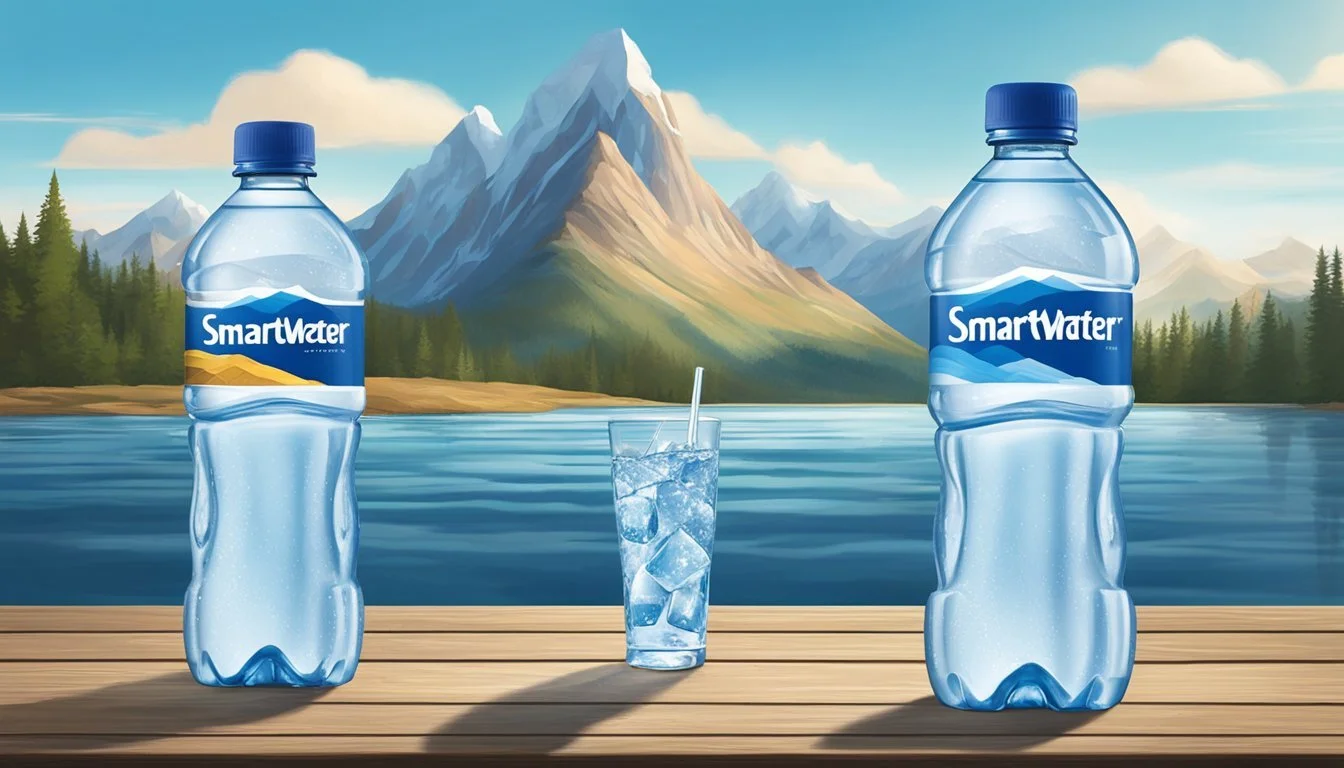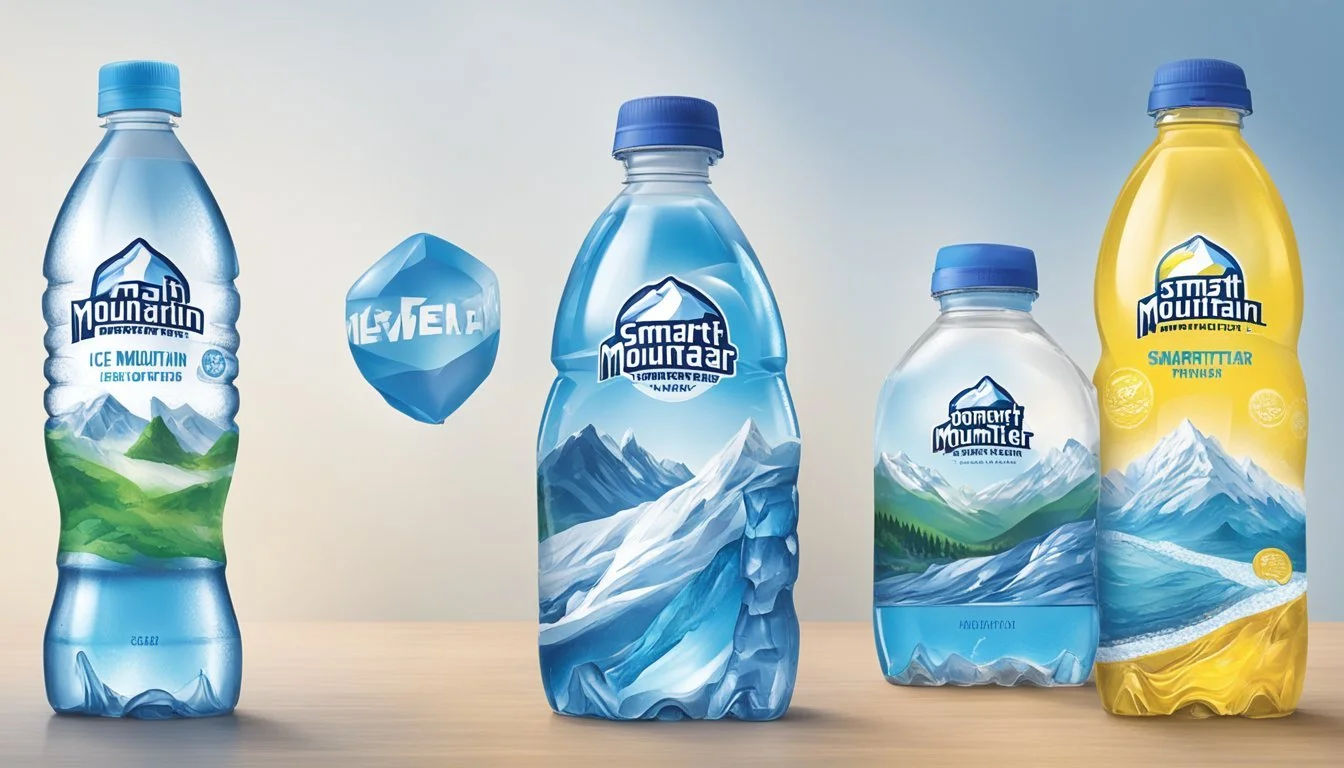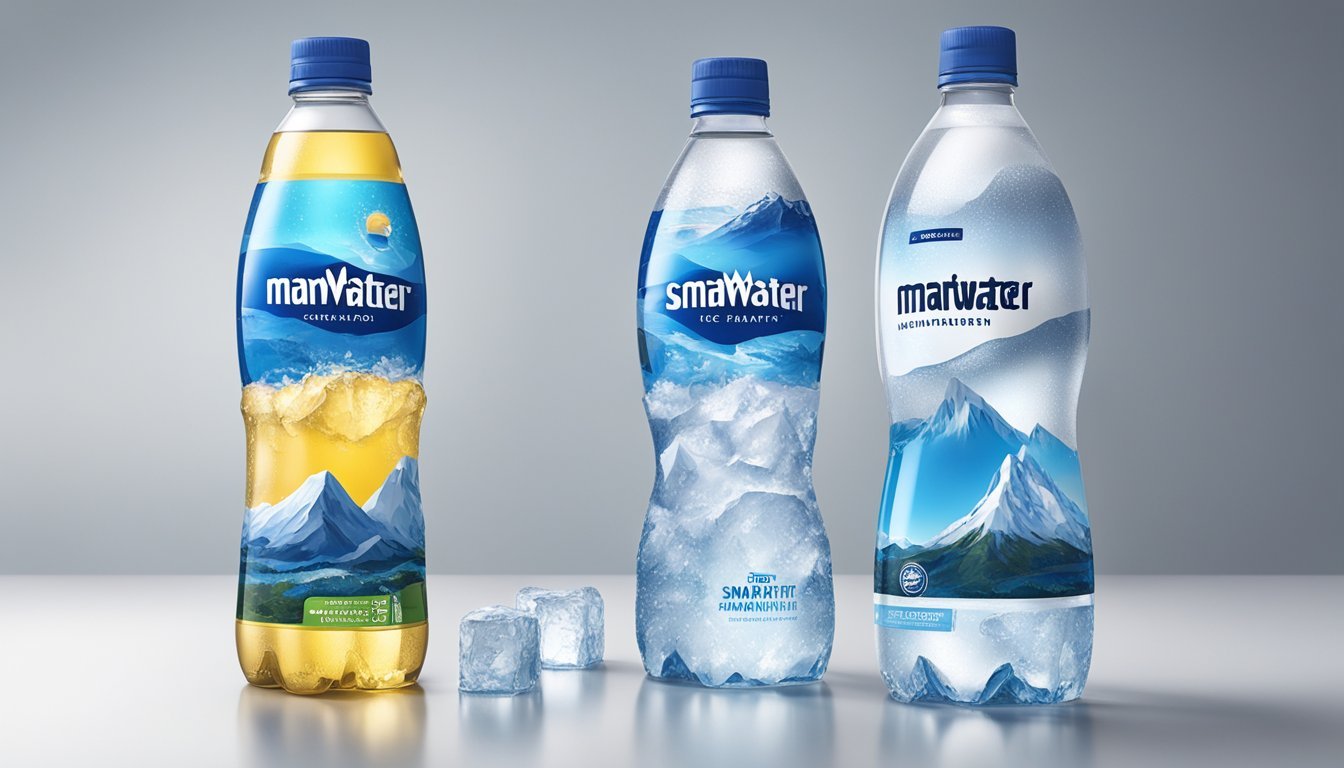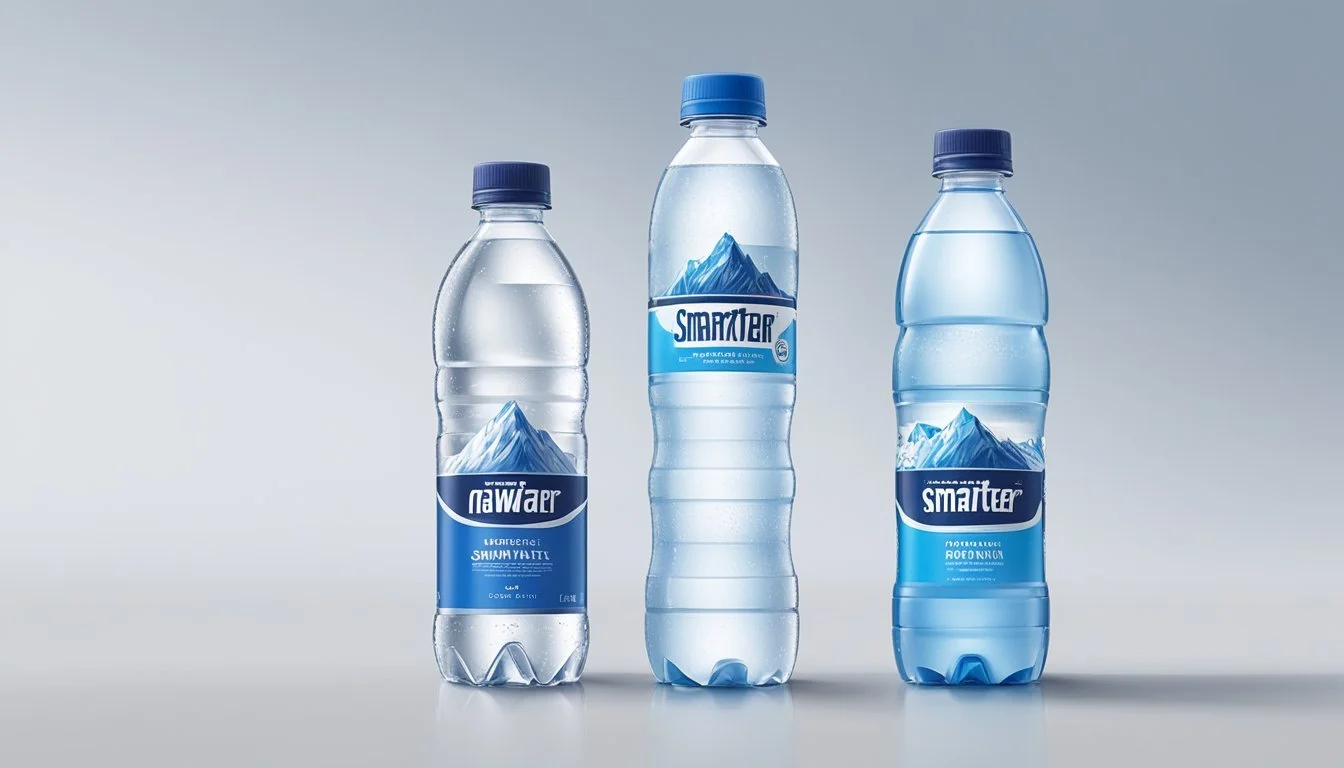Ice Mountain vs. Smartwater
Comparing Quality and Taste in Bottled Water Brands
In the realm of bottled water, Ice Mountain and Smartwater have emerged as prominent figures catering to a broad range of consumers seeking convenience, taste, and hydration benefits. Ice Mountain, sourced from natural springs, is often lauded for its refreshing taste and regional sourcing. Its appeal lies in the commitment to providing a natural and crisp water, boasting a mineral balance that many consumers find pleasing to the palate.
Smartwater, on the other hand, takes a different approach with its vapor-distilled water that includes added electrolytes for taste. This process of purification emulates the hydrologic cycle, resulting in a product that is not only clean but also designed to offer a distinctive, crisp finish. The addition of electrolytes aims to enhance hydration and taste, positioning Smartwater as a premium product in the consciousness of the health-conscious and active consumer. This comparison exercises a careful evaluation of both products, scrutinizing their respective claims of quality, taste, and hydration effectiveness.
The Importance of Hydration and the Role of Bottled Water
Maintaining proper hydration is a cornerstone of health, and bottled water provides a convenient solution for staying hydrated on the go. In this section, we'll explore how hydration supports bodily functions and how bottled water fits into the hydration equation.
Understanding Hydration
Hydration refers to the body's balance of fluids, which is crucial for various physiological processes. Every cell and system in the body requires water to function optimally. When they consume an adequate amount of water, individuals support their metabolism, joint lubrication, temperature regulation, and more. Hydration also plays a key role in the transportation of electrolytes, such as sodium and potassium, which are vital for muscle function and nerve signaling.
Bottled Water in Hydration
Bottled water provides a practical means to hydrate, especially when access to clean tap water is limited or non-existent. It can be a source of necessary minerals for health; for instance, some are rich in calcium or magnesium. However, consumers should be aware of the sodium levels in certain bottled waters to ensure they align with their dietary needs. For example, Ice Mountain Water is noted to have a pH level above 7, indicating slight alkalinity which some believe might have beneficial hydration effects, although these claims are not universally supported by scientific evidence.
Comparative Analysis: Ice Mountain and Smartwater
When evaluating Ice Mountain and Smartwater, consumers often look at several factors including source, filtration process, taste, and packing.
Source:
Ice Mountain is typically sourced from groundwater or public water sources and then goes through a filtration process. Smartwater, on the other hand, begins with vapor-distilled municipal water and incorporates added electrolytes for a distinct taste.
Filtration Process:
Ice Mountain: Utilizes a multi-step filtration process, including reverse osmosis.
Smartwater: Employs vapor distillation, resembling the natural hydrologic cycle, followed by the addition of electrolytes.
Taste:
The taste is subjective, but Ice Mountain is often described as fresh and natural, while Smartwater is touted for its purity and slightly sweetened taste due to the added electrolytes.
Packing:
Ice Mountain: Available in various sizes, the bottles are made with up to 50% recycled plastic.
Smartwater: Known for its sleek and distinctive packaging, also available in different sizes, with a move towards more sustainable packaging materials.
It’s crucial to note that personal preferences and priorities will significantly affect which product is favored. Some consumers may prefer the natural sourcing and classic taste of Ice Mountain, while others may favor the purified and electrolyte-enhanced profile of Smartwater. The environmental footprint and cost might also influence decision-making. Therefore, shoppers may want to consider these factors in light of their own values and taste preferences.
Brand Histories and Water Sources
In considering Ice Mountain and Smartwater, their distinct histories and sources of water are pivotal to understanding the brands. Each has a unique origin story and process of sourcing their water, which will be explored within their respective subsections.
Ice Mountain History
Ice Mountain is a brand of bottled water from BlueTriton Brands, with its origins in the Midwest United States. Ice Mountain sources their water from two primary locations: Sanctuary Spring in Mecosta County, Michigan, and/or Evart Spring in Evart, Michigan. These sources are both natural groundwater wells, and the brand emphasizes its commitment to sustainable water source management.
Smartwater History
Smartwater is a product of The Coca-Cola Company and entered the market offering a different approach. Unlike traditional spring water sources, Smartwater begins with municipal water that then undergoes purification. The process includes distillation and the addition of electrolytes for taste enhancement. Smartwater's sourcing method is designed to provide consistent purity and taste by replicating the natural hydrologic cycle in a controlled environment.
Production Processes and Filtration
When comparing Ice Mountain and Smartwater, the production processes and specifically the filtration methods they employ are crucial to understanding the quality and the purity of the water provided.
Ice Mountain Filtration Process
Ice Mountain employs a multi-step filtration process for its bottled water. The initial phase includes screening, where large particles are removed from the water. Following this, a combination of sediment filtration, which traps smaller particles, and a carbon filtration phase, that reduces contaminants and improves taste, is applied. While information from the search results does not specify the inclusion of reverse osmosis or ozone treatment in Ice Mountain's process, these methods are commonly used in the bottled water industry for their effectiveness in purifying water.
Smartwater Filtration Process
Smartwater takes pride in its purification process, prominently featuring the use of reverse osmosis to remove the majority of dissolved solids and contaminants from the water. After the reverse osmosis stage, the water undergoes a unique vapor distillation process, inspired by the natural hydrologic cycle. This method ensures a level of purity and is complimented by the addition of electrolytes for taste. Finally, Smartwater water bottles are sealed with ultraviolet light and ozone treatment to ensure sterilization and maintain purity until the consumer opens the bottle. The brand's filtration process, identified as Hydro-7, is a proprietary method that emphasizes the removal of impurities while retaining a clean, crisp taste.
Nutritional Content and Health Implications
When comparing Ice Mountain and Smartwater, the nutritional content and health implications play a critical role in determining which bottled water brand may be a better choice. Consumers should be particularly aware of the presence of electrolytes, potential contaminants, and how these might affect their overall health.
Electrolyte Enhancement
Ice Mountain water is typically sourced from springs and may naturally contain some minerals; however, it does not advertise enhanced electrolyte content. In contrast, Smartwater is vapor-distilled with added electrolytes, such as calcium chloride, magnesium chloride, and potassium bicarbonate, for taste and hydration benefits. The presence of electrolytes is a feature that consumers may seek for various health benefits, including improved hydration and balance of bodily fluids.
Contaminant Levels
Concerning contaminants, consumers should consider the levels of lead, heavy metals, arsenic, and microplastics, which have been found in some bottled waters. Although Ice Mountain claims to originate from natural springs, it is essential to scrutinize the filtration process to ensure safety from these contaminants. Smartwater's vapor-distillation process is said to eliminate contaminants and is followed by re-mineralization for taste. The presence of PFAS chemicals is a concern in some bottled waters; however, there is no specific evidence suggesting that Ice Mountain or Smartwater contain these substances above the levels recommended by health guidelines.
Flavor Profiles and Taste Comparisons
When comparing Ice Mountain and Smartwater, one must consider the distinct characteristics of each brand's flavor profile. These differences can be subtle yet significantly impact consumer preferences, as revealed in taste tests.
Ice Mountain Taste Profile
Ice Mountain water is often described as having a very neutral flavor with no distinct aftertaste. It comes from springs in the Midwest and is known for its clean and straightforward taste. Ice Mountain's lack of a strong flavor profile can be seen as a benefit for those who prefer their water to taste pure and refreshing.
Smartwater Taste Profile
In contrast, Smartwater goes through a vapor distillation process, similar to the way clouds form rain. This produces a taste that some consumers appreciate for its purity and crisp finish. Smartwater also adds electrolytes like calcium chloride and magnesium chloride, which can slightly alter the taste, giving it a unique subtle flavor that sets it apart from other distilled waters.
Consumer Taste Test
Consumer taste tests show a divide in preference between Ice Mountain and Smartwater. Factors such as the presence of electrolytes and the purification process can affect an individual's taste perception. Smartwater usually appeals to those who favor a slight mineral enhancement in their water, while Ice Mountain is often preferred by individuals who look for an unaltered, natural taste. These preferences confirm that the perception of taste is subjective and can vary widely among consumers.
Packaging and Environmental Considerations
In the comparison between Ice Mountain and Smartwater, the packaging materials and their implications for environmental sustainability are key factors.
Bottle Materials and BPA Content
Ice Mountain's bottles are made from PET plastic, which is free from BPA, thus minimizing the associated health concerns about chemicals leaching into the water. Smartwater also uses BPA-free packaging, ensuring that its bottles are safe for consumer use. The absence of BPA aligns both brands with consumer health trends and regulatory guidelines that advocate for BPA-free food and beverage containers.
Recycling and Sustainability Efforts
Ice Mountain has shown a commitment to the environment through its "Made For A Better Tomorrow" campaign, encouraging recycling and using 100% recycled plastic (rPET) for its bottles. Smartwater also focuses on eco-friendly packaging, with bottles designed to be 100% recyclable. Both brands' efforts in recycling and using eco-friendly materials reduce their overall environmental impact. However, the effectiveness of these initiatives in practice depends on the proper recycling by consumers and the capacity of local recycling programs.
Consumer Perception and Brand Reputation
When exploring the realm of bottled water, consumer perception and brand reputation play a significant role in the popularity and sales performance of products. Both Ice Mountain and Smartwater have cultivated their images and consumer bases with varying strategies and to different extents.
Market Presence and Consumer Loyalty
Ice Mountain, a product of Nestlé Waters, enjoys a strong market presence in the Midwest region, taking advantage of the "local" appeal that ties into consumer loyalty. The brand often emphasizes its midwestern roots in marketing campaigns, positioning itself as a reliable and homegrown choice for bottled water.
Smartwater, owned by Coca-Cola, has a global market presence, known for its sleek branding and association with high profile celebrities. The brand's investment in purity and electrolyte-enhanced formulas has built a strong following among consumers looking for a premium hydration experience. Unlike Ice Mountain, Smartwater's marketing strategies focus more on a global audience, which is reflected in its broad consumer base that values the technological process of vapor-distillation that Smartwater employs.
Social Media Influence
On social media, both brands have distinct approaches. This directly impacts their online reputation and aligns with their overall branding strategies.
Ice Mountain:
The brand maintains a modest social media presence, choosing to focus more on traditional marketing efforts.
Twitter Engagement: Limited with a focus on regional outreach and local sponsorships.
Smartwater:
Strong social media engagement, capitalizing on its association with Coca-Cola's marketing powerhouse.
Twitter Followers: Substantial due to strategic influence campaigns and high visibility endorsements.
Pepsico: Not relevant as Smartwater is aligned with Coca-Cola, its competitor.
Both Ice Mountain and Smartwater's reputations are driven by their respective market presences and the effectiveness of their branding on social media. Ice Mountain's approach appeals to regional communities and their sense of local identity, while Smartwater's strategy leverages its global appeal and sophisticated branding to cultivate brand loyalty.
Regulatory Standards and Health Compliance
In the realm of bottled water, adherence to strict regulations and standards is pivotal for ensuring consumer safety. Both Ice Mountain and Smartwater are subjected to these regulatory frameworks, which aim to guarantee the quality and safety of bottled water.
Government Regulations
The U.S. Food and Drug Administration (FDA) mandates bottled water standards, in alignment with the Environmental Protection Agency (EPA) regulations for public drinking water. These standards are designed to protect public health, and bottled water brands are legally required to meet them. Just as the EPA regulates tap water, the FDA ensures bottled water is:
Free from contaminants
Processed, packaged, and labeled according to federal guidelines
Ice Mountain and Smartwater comply with these regulations, conducting regular testing for a range of contaminants including chemical, microbiological, and radiological hazards.
Third-Party Certifications
Beyond governmental oversight, third-party organizations like the International Bottled Water Association (IBWA) play a significant role in certifying product standards. They often impose additional criteria that surpass federal requirements. For example:
Ice Mountain: Claims adherence to both FDA and IBWA standards, undergoing rigorous filtration processes.
Smartwater: It is marketed as a vapor-distilled product with added electrolytes, aligning with purity expectations set by certifying bodies.
Third-party certifications can bolster consumer confidence by demonstrating a commitment to quality that exceeds the minimum health and safety requirements.
Price Comparison and Economic Factors
When considering Ice Mountain and Smartwater, consumers often evaluate their price and market accessibility to determine the better economical choice for bottled water.
Cost-Effectiveness
Ice Mountain is known for its affordability, often priced lower than Smartwater. The brand leverages its Midwestern roots and extensive distribution channels to offer competitive pricing. In contrast, Smartwater positions itself as a premium water brand, which is reflected in its higher price point.
Ice Mountain: Generally offers a lower cost per bottle, appealing to budget-conscious consumers.
Smartwater: Priced higher due to its vapor-distillation process and addition of electrolytes, targeting consumers willing to pay a premium for enhanced water.
Market Availability
Both brands enjoy wide market access in the United States, but their availability varies by state. Ice Mountain is readily available in the Midwest due to its regional production and distribution.
Ice Mountain: Strong presence in the Midwest; can be harder to find in coastal states.
Smartwater: Broad national distribution, available in most major retailers across various states.
The brands' strategic market placement influences consumer purchasing decisions based on local availability and price sensitivity.
Final Verdict: Ice Mountain vs. Smartwater
In considering which bottled water is better between Ice Mountain and Smartwater, analysis focuses on aspects critical to health, hydration, and taste. These factors influence consumer choice and define the bottom line in terms of best bottled water selection.
Best for Health and Hydration
Ice Mountain is known for its natural mineral content, which can be beneficial for health and hydration. The presence of minerals such as calcium and magnesium in Ice Mountain may aid in daily intake of these essential nutrients.
Smartwater, on the other hand, is vapor-distilled with added electrolytes for a crisp, clean taste. The electrolytes in Smartwater are potassium, calcium, and magnesium, which are designed to mimic the natural composition found in the human body, making it a strong candidate for effective hydration.
Comparison Table:
Feature Ice Mountain Smartwater Source Natural springs Vapor-distilled Mineral Content Naturally occurring Electrolytes added Electrolyte Enhancement No Yes Potential Health Benefits Minerals Hydration
Best for Taste
Flavor profile is subjective, but Ice Mountain is often described as having a fresh taste due to its natural spring source, without any additional processing affecting its flavor.
Smartwater, with its purity focus and additional electrolytes, aims to offer a taste that is not just clean, but also crisp and refreshing. Its process of vapor distillation followed by electrolyte enhancement tends to result in a distinct taste preferred by many who enjoy a more processed and consistent flavor.
Taste Preference:
Natural: Some consumers prefer the natural taste of Ice Mountain derived from its spring source.
Enhanced: Others favor the clean, crisp taste of Smartwater due to its vapor distillation and added electrolytes.
In comparing Ice Mountain and Smartwater, the choice of best bottled water relies on individual preferences for natural minerals versus added electrolytes, and natural spring taste versus a clean, distilled flavor profile.









